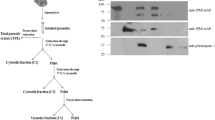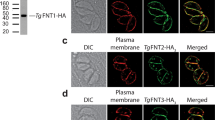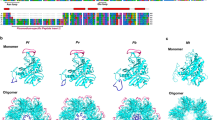Abstract
THE mammalian malaria host–parasite systems seem particularly useful for studies aimed at elucidating the biochemical mechanisms of such interactions. During the vertebrate phase of their life cycles the malaria organisms are intracellular parasites of the red cell. The mature mammalian host red cell is also relatively simple metabolically; its energy metabolism is solely that of Embden–Meyerhof glycolysis and it also lacks the capacity for protein synthesis. We therefore studied several aspects of red cell glycolysis in monkeys heavily infected with Plasmodium knowlesi and mice heavily infected with P. berghei. In both these systems we have found an increase in red blood cell adenosine triphosphate (ATP) and a decrease in red cell 2,3-diphosphoglycerate (DPG). We also have evidence that these malaria parasites introduce a pyruvate kinase isozyme into their host red cells in amounts sufficient to alter red cell glycolysis. First, glycolytic intermediate data demonstrate an in vivo increase in pyruvate kinase activity in infected red cells; second, there is an increase in pyruvate kinase Vmax activity in infected cells; and third, gel electrophoretic patterns show a new pyruvate kinase isozyme in infected cells. We suggest that this alteration in red cell glycolysis is in a direction favourable to the parasite because it will increase red cell ATP at the expense of red cell DPG.
This is a preview of subscription content, access via your institution
Access options
Subscribe to this journal
Receive 51 print issues and online access
$199.00 per year
only $3.90 per issue
Buy this article
- Purchase on Springer Link
- Instant access to full article PDF
Prices may be subject to local taxes which are calculated during checkout
Similar content being viewed by others
References
Oelshlegel, F. J., Jr, Brewer, G. J., Penner, J. A., Schoomaker, E. B., in Haemoglobin and Red Cell Structure and Function (edit, by Brewer, G. J.), 377–396 (Plenum, New York, 1972).
Oelshlegel, F. J., Jr, Sander, B. A. J., and Brewer, G. J., in Erythrocyte Structure and Function (edit, by Brewer, G. J.) (Alan R. Liss, Inc., New York, in the press).
Zürcher, C., Loos, J. A., and Prins, H. K., Biblthca haemat., 23, 549–556 (1965).
Beutler, E. Red Cell Metabolism: A Manual of Biochemical Methods (Grune and Stratum, New York, 1971).
Brewer, G. J. Introduction to Isozyme Techniques (Academic, New York, 1970).
Brewer, G. J., and Powell, R. D., Proc. natn. Acad. Sci. U.S.A., 54, 741–745 (1965).
Eaton, J. W., and Brewer, G. J., Nature, 222, 389–390 (1969).
Trager, W., J. exp. Med., 92, 349–366 (1950).
Ball, E. G., McKee, R. W., Anfinsen, C. B., Cruz, W. O., and Geiman, Q. M., J. biol. Chem., 175, 547–571 (1948).
Trager, W., J. Protozool., 14, 110–114 (1967).
Brewer, G. J., and Coan, C. C., Milit. Med., 134, 1056–1067 (1969).
Fletcher, K. A., Fielding, C. M., and Maegraith, D. G., Am. J. trop. Med. Parasitol., 64, 487–496 (1970).
Author information
Authors and Affiliations
Rights and permissions
About this article
Cite this article
OELSHLEGEL, F., SANDER, B. & BREWER, G. Pyruvate kinase in malaria host–parasite interaction. Nature 255, 345–347 (1975). https://doi.org/10.1038/255345a0
Received:
Accepted:
Issue Date:
DOI: https://doi.org/10.1038/255345a0
This article is cited by
-
Plasmodium falciparum enolase: stage-specific expression and sub-cellular localization
Malaria Journal (2009)
-
Phenotypic expression of pyruvate kinase deficiency and protection against malaria in a mouse model
Genes & Immunity (2004)
-
Pyruvate kinase deficiency in mice protects against malaria
Nature Genetics (2003)
Comments
By submitting a comment you agree to abide by our Terms and Community Guidelines. If you find something abusive or that does not comply with our terms or guidelines please flag it as inappropriate.



